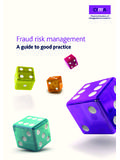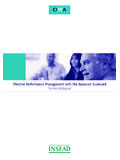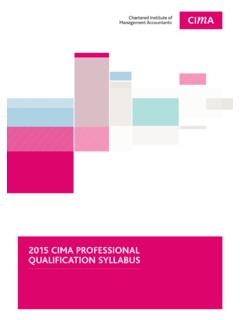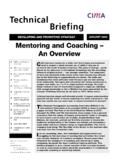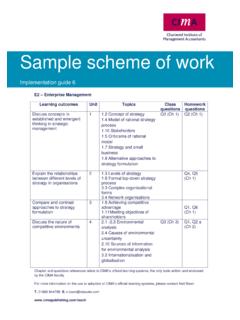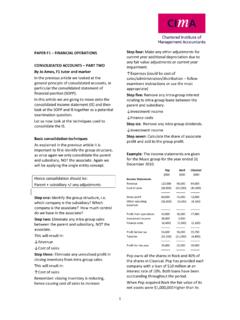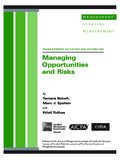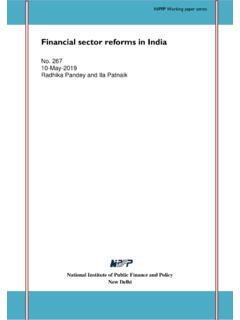Transcription of Incorporating ethics into strategy: developing sustainable ...
1 Incorporating ethics into strategy: developing sustainable business models ethics are pivotal in determining the success or failure of an organisation. They affect a company's reputation and help to define a business model that will thrive even in adversity. This paper sets out how finance professionals can shape their organisations'. ethical agendas and incorporate ethics into strategy to ensure long term sustainability. This second edition includes updates and new global case studies. discussion paper About CIMA. CIMA, the Chartered Institute of management Accountants, founded in 1919, is the world's leading and largest professional body of management accountants. With more than 172,000 members and students operating in 168 countries, CIMA works at the heart of business, in industry, commerce, public sector and other not-for-profit organisations. Partnering directly with employers, CIMA.
2 Sponsors leading-edge research, constantly updating its qualification, professional experience requirements and continuing professional development to ensure that it remains the employers'. choice when recruiting financially trained business leaders. CIMA is committed to upholding the highest ethical and professional standards of members and students and to maintaining public confidence in management accountancy. CIMA believes that sustainability is a key issue for all organisations across the world and is committed to supporting its members and students in addressing this challenge. For more information, please see and For more information about CIMA, please visit About the authors Victor Smart is director of profile and communications at CIMA, Tanya Barman is head of ethics and Nilushika Gunasekera is technical manager, Sri Lanka. CIMA would like to thank the individuals and organisations that helped inform this report: Brandix, Kimberly-Clark and PricewaterhouseCoopers Poland input to the case studies.
3 Organisations represented in the responsible business round table discussions included: Aveva plc, Forum For The Future, Global Witness, the Institute of Business ethics , the International Business Leaders' Forum, Man Group plc and Warner Bros. Neither these organisations nor the individuals representing them are responsible for the contents of this paper . Contents Conclusions 1. Recommendations 2. Findings 3. Box 1: Questions boards must ask themselves 6. Box 2: The Prince's Accounting for Sustainability initiative and the International Integrated Reporting Committee (IIRC) 8. Case study 1: Kimberly-Clark, personal products, US 9. Case study 2: Brandix, clothing manufacturing, Sri Lanka 10. Case study 3: PricewaterhouseCoopers, professional services, Poland 11. Box 3: Global ethics and sustainability initiatives 12. Conclusions 1. Strong ethical policies that go beyond upholding the law can add great value to a brand, whereas a failure to do the right thing can cause social, economic and environmental damage, undermining a company's long-term prospects in the process.
4 2. Once they have adopted an ethical approach, companies will often find there are bottom line benefits from demonstrating high ethical standards. 3. The ethical tone comes from the top. 4. High quality management information on social, environmental and ethical performance is vital for monitoring the environmental and social impacts of a company and for compiling connected reports showing how effective its governance arrangements are. 5. Corporate communications and reporting on sustainability need to do more than just pay lip service to the green agenda. They need to provide hard evidence of the positive impact on society, the environment and the strategic returns for the business, and how any negative effects are being addressed. 6. management accountants have a particular ethical responsibility to promote an ethics based culture that doesn't permit practices such as bribery.
5 1 | Incorporating ethics into strategy: developing sustainable business models Recommendations 1. ethics must be embedded in business models, organisational strategy and decision making processes. 2. Senior managers and business leaders must demonstrate an ethical approach by example. This will show that middle and junior managers will be rewarded for taking an ethical stance and create the appropriate organisational culture. 3. Non-executive directors should act as custodians of sustainability, with the particular duty of ensuring that their executive colleagues are building a sustainable business. 4. Governance structures should include people with appropriate skills to scrutinise performance and strategy across social, ethical and environmental issues. 5. Managers must come to problems with prepared minds', looking at ways in which an organisation can benefit from an ethical approach rather than one that relies narrowly on cost cutting or compliance.
6 6. Finance professionals must play an active role as ethical champions by challenging the assumptions upon which business decisions are made. But they must do so while upholding their valued reputation for impartiality and independence. 7. management accountants are encouraged to help ensure that their businesses are measuring performance on an appropriate time scale that will deliver sustained and sustainable success. 8. Business leaders should use the skills of the finance team to evaluate and quantify reputational and other ethical risks. 9. Finance professionals need to take social, environmental and ethical factors into account when allocating capital, so that sustainable innovation is encouraged. Incorporating ethics into strategy: developing sustainable business models | 2. This paper distils findings from a series of high level round table discussions on the future of business ethics .
7 Senior business decision makers met experts in ethics , corporate responsibility and environmental sustainability. Together they discussed how organisations should approach social, environmental, economic and ethical issues that go beyond the financial bottom line. Recommendations are provided on how companies can respond to society's changing ethical demands, as well as relevant case studies of business practice from around the world. Businesses can be tempted to make short-term gains by turning a When we talk about sustainability, blind eye to ethics . Despite codes of practice, regulatory oversight we talk about are we going to be and ever-increasing public pressure, many firms routinely ignore ethical considerations. Some even claim that a business simply around? this is really about your needs to abide by the law without concerning itself with broader reputation and whether people ethical issues.
8 Yet such disregard can undermine the wider trust you. economy and, in time, cause irreparable damage. Lessons must be learned from the corporate collapses of the past decade: myopic strategies can create massively profitable entities, yet impressive initial results may turn out to be unsustainable. There is a strong business case for running companies in an ethically responsible way and for finance professionals to facilitate this. A socially and environmentally ethical approach ensures a company's ability to thrive in the long-term by protecting its reputation, its license to operate, its supply chain, its relationships with partners and its ability to recruit talent. It's about avoiding corporate collapse as a result of litigation or fraud. Of the 28 companies that fell out of the world-leading S&P 500. index in the past ten years, comparatively few casualties were Society should not let unethical claimed by shifts in technologies and markets.
9 More were victims companies make the returns that of massive fraud (as with Enron and WorldCom) or had leaders they have been allowed to. who'd failed to create a sustainable business model. This was evident most graphically in the financial services industry, with the likes of Lehman Brothers, Bear Stearns and Wachovia choosing huge short-term gains at the cost of their long-term survival. Similarly, UK electronics company Marconi was brought down by it its unsustainable plan for its business. While some firms consistently fail to consider ethical factors, others have given themselves a competitive edge by establishing strong credentials in this area. For instance, Toyota, which is now the world's largest car maker, boosted its global standing with its pioneering work in the nineties on the hybrid Prius model. Coca-Cola thought it commercially worthwhile to take a minority stake in the UK fruit drinks firm Innocent, which boasts that it gives away a tenth of all its profits.
10 And McDonald's is investing heavily in activities aimed at associating it with ethical and environmental awareness as it rebuilds its brand and attempts to overcome decades of negative publicity. 3 | Incorporating ethics into strategy: developing sustainable business models The round table discussions highlighted that the link between Society and the bottom line ethics and business success has become far clearer in recent years, are the two issues that will put as companies realise that corporate interests must be aligned with the broader concerns of society if they are to survive. In a pressure on companies to be successful company, ethics are embedded in decision making and ethical. long-term strategy. Doing the right thing' is not an afterthought that's bolted on to the mainstream activities that generate its profits. Successful, sustainable firms aspire to integrate ethics into all aspects of strategy.
